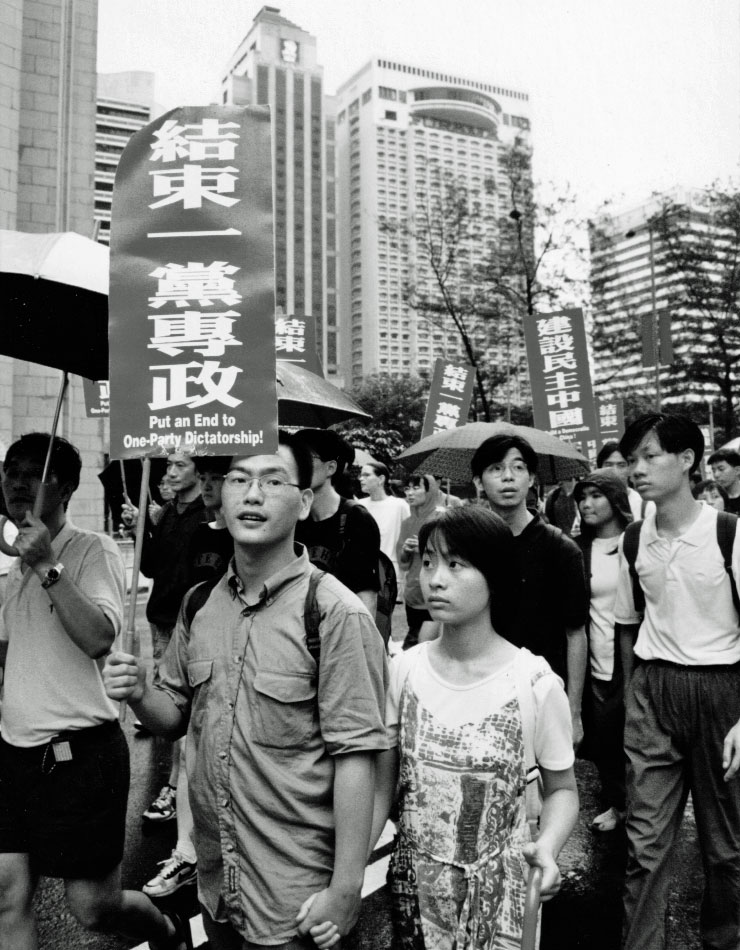Taiwan, Hong Kong, UK & Japan Election under the Red FlagMay 1998
The first election for the Legislative Council was held in Hong Kong on May 24 since the handover of the sovereignty to the People’s Republic of China. Despite of the heavy rain, the election had the highest voter turnout of 53%, and pro-democracy candidates won most of the directly elected seats. The press considered that floating votes influenced these results. The floating voters gave their votes to the pro-democracy candidates because they got tired of the depression and the government that didn’t take any measures to cope with it. I interviewed the citizens of Hong Kong and Beijing over the phone, while paying attention to the specialist analyses.
The first Legislative Council election ? the voices of the citizens through the telephone interviews

“I voted for ‘the Frontier’,” said Chen Rongbin (43), a tour guide in Hong Kong. I could tell by his buoyant voice that he was pleased with the election results. ‘The Frontier’ is led by Liu Huiqing, who sued the Hong Kong branch office manager of the Hsinhua News Agency for violation of the privacy protection law. “I’d like to get rid of bad guys. The number of the jobless has increased because Filipinos and Thais snatch away their jobs. Corrupt government officials take bribes from them and let their illegal stays to pass.”
China managed to earn money equivalent to 1.2 trillion yen in Hong Kong only during last year. But a Chinese government-managed investment company listed on the Hong Kong Stock Exchange went bankrupt early in this year. Not only stock prices dropped sharply but also construction work has been suspended in many places. The unemployment rate rose to 3.8 %, the highest level in 14 years. Since the number of tourists has decreased because of depression in all Asia, Chen doesn’t do much business. He said, “People are aware of the problems, so that they voted in the election.” He expects much of the new Legislative Council.
The Hsinhua News Agency only said, “On the whole, the election was open, fair and clean,” but it didn’t mention the revival of the pro-democracy forces. Western journalists criticized the Hsinhua News Agency for the report, but they themselves rather had a political whiff. When I called Li Jun = fictitious name (36), an executive of a publishing company in Beijing, he said, “I would forget about the election if you didn’t ask me.” He said that not only he but also their readers were not interested in the election in Hong Kong. “I don’t care who is elected to the legislature in a provincial city. I’m satisfied with my present work here and more interested in the culture of the mainland. Hong Kong doesn’t appeal to me at all.”
The number of the seats directly elected shall be 30 seats in the Hong Kong Legislative Council (60 seats) six years later, but only 20 seats were contested at this direct election. After Hong Kong’s handover the election system was also changed from the single-member constituency system, where a candidate electoral fortune depends on his popularity, into the medium proportional-representation constituency system, where pro-Chinese parties are advantageous, so that the People’s Republic of China can secure her sovereignty under the system consistent with the Basic Law of Hong Kong.
Even if it is a direct election, people have to register themselves in the electoral register. Only about 2.8 million people, 65 % of the eligible citizens, have the right to vote. One of them, an insurance salesman Sheng Di = fictitious name (33) said, “I registered myself two years ago, because an official in charge was persistent. But I have never voted yet.” He said he was not interested in politics because the government had not produced any satisfactory results. Since the SAR government didn’t take any appropriate measures to cope with situations such as the epidemic of chicken influenza and the overcharging scandal where hotels charged Japanese tourists too much, the civic economy was damaged badly. “Business is more important than politics. And then my family.” Sheng Di busies himself with selling insurance today too.
A gap in enthusiasm between the press and the citizens
During the telephone interviews with the citizens, I found there was a gap in enthusiasm between the press and the citizens. Now Chinese can make a better living if they work hard, unless they are radical in political activities. Maybe this is proof that socialism and capitalism successfully harmonize in both mainland China and the Hong Kong Special Administrative Region. Dr. Unryu Suganuma of the Institute of Moralogy, a specialist in Japanese Chinese relations, analyzed this on neutral ground.
He pointed out that Britain started a democratic election in Hong Kong under the regime of the last governor Patten from the ulterior motive for wanting to keep her influence on Hong Kong even after the handover. The voter turnout in the British colonial period was low, which was at the level of 30 percent, but considering that the citizens had rather great interest in politics because of the Tiananmen Square Incident and the insecure establishment after the handover, there was a doubt that the figures were manipulated. Now people have been less worried about the government’s commitment to keep the ‘One Country, Two Systems’ policy, because the Chinese Communist Party didn’t oppress them for the past year. Dr. Suganuma doesn’t regard this 53 % turnout as high. He thinks it showed that Hong Kong citizens were relieved and have trust in the Chinese government.
If you take notice of the pro-democracy policy of mainland China that introduced free election system at village level, that is, at the bottom, it is predictable that a Hong Kong Legislative Council election under the Red Flag will turn to a full-scale democratic election step by step. He said that we should have a proper understanding of China that is adopting opposite approaches to democratization from Russia’s top-down approaches.
